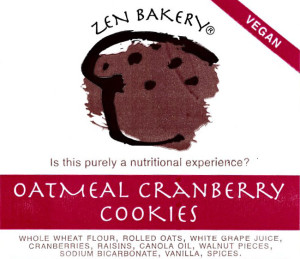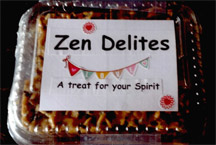Petitioner sought to cancel a registration for the mark ZEN DELITES for “cookies,” claiming a likelihood of confusion with its mark ZEN BAKERY for bakery goods, including cookies [BAKERY disclaimed]. Respondent Susan DeFuria conceded priority, and goods overlapped. So it all came down to the marks. How do you think the cookie crumbled? Jack Q. Drake Revocable Trust v. Susan DeFuria (May 11, 2016) [not precedential].

The Marks: The Board perceptively found that, “[i]n appearance and sound the two marks are similar to the extent that the first word of each mark is ZEN. The marks differ in appearance and sound by virtue of their other terms, which are BAKERY and DELITES, respectively.”
Respondent conceded that ZEN is a well-known term “as a Buddhist philosophy implying a superior way of being and state of mind.” Neither party provided evidence as to the meaning of DELITES, but it is “obviously a recognizable variant of “‘delights.'” And BAKERY is generic or highly descriptive in the field of baked goods.
Considering the meanings of the marks in their entireties, ZEN BAKERY might suggest a baking establishment that follows or is in some way guided by Zen principles. ZEN DELITES might suggest the pleasures (“delights”) of practicing Zen philosophy, or good things derived from the principles or practice of Zen. These meanings and connotations are distinguishable from those of Petitioner’s mark.
The Board agreed with Petitioner that BAKERY should be given less weight when considering its mark, but the marks still must be considered in their entireties.
The Board found that the dissimilarities in the marks outweigh the similarities.

Letter of Protest: Petitioner pointed to the USPTO’s acceptance of its letter of protest during prosecution of Respondent’s underlying application, claiming that this shows prima facie evidence of confusing similarity. Not so, said the Board.
The Deputy Commissioner, in granting the letter of protest, did not make any finding as to likelihood of confusion, other than to say that Petitioner’s Reg. Nos. 1529901 and 4104964 were relevant to the Examining Attorney’s ultimate decision. In following letter of protest procedure, the Deputy Director did not instruct the Examining Attorney to do any more than “consider the following [registrations] and make an independent determination whether to issue a requirement or refusal …” Accordingly, it is clear that the Deputy Director’s action is not a prima facie demonstration of confusing similarity.
Prior Lawsuit:Petitioner pointed to a successful prior lawsuit against a third party as evidence of the strength of its mark, but the Board was not impressed. The prior suit involved a mark nearly identical to petitioner’s mark, and “does not show that a court would issue a similar injunction against a different mark, such as Respondent’s mark.” Moreover, the litigation was largely resolved by settlement.
Purchaser Care: As to purchaser care, even though cookies are inexpensive items, that does not mean they are “purchased carelessly or without discrimination.” [So much for the impulse purchase argument – ed.]
The Board concluded that the first du Pont factor controlled, and it dismissed the petition for cancellation.

